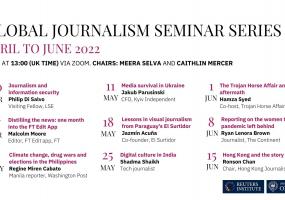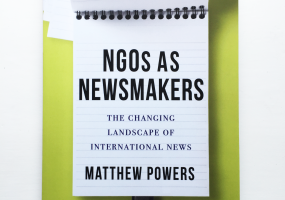Seminar report: Making an impact with journalism in today’s world
26 Jan 2017
by Alexander Fanta
In today’s world of fake news, numbers make money. Bogus stories like ‘fraudulent Clinton votes found in Ohio warehouses’ are viewed by millions of people online.
Meanwhile, important investigations like the one by Washington Post journalist David Fahrenthold on Donald Trump’s use of his charity for business get knocked off the news by the Brangelina divorce. Even audiences that care about real news get locked in by the echo-chamber effect, says Rachel Oldroyd.
In this difficult environment for traditional media, the Bureau of Investigative Journalism, launched in 2010, and other like-minded non-profits try to lift up stones other journalists aren’t looking at, Oldroyd says.
They try to find under-investigated stories and, by researching and writing them, put overlooked issues on the agenda. ‘We start the investigation saying “What is our policy ask, what do we want to change”’, the Bureau’s editor says.
To achieve the biggest-possible impact, the Bureau partners with established publishing outlets such as the Sunday Times, the Guardian or the Sunday Mirror. These platforms help to push the stories and get audiences and policy-makers to respond, Rachael Oldroyd, Managing Editor at the Bureau explains.
But even when they can’t get the level of audience they are aiming for, the investigative reports keep digging, and in some cases, such as the Bureau’s reporting on drone warfare, the stories started to get picked up by news agencies after over a year, she says.
Meanwhile Oldroyd and her colleagues try to build communities around their reporting by organising debates and events that relate to their findings. They also try to make sure decision makers get their stories.
Two years after they started reporting on the shortage of affordable housing in the UK, the Bureau took the issue to a roundtable debate with local councillors and campaigners. Only then did politicians start to listen, Oldroyd recounts.
To make their work sustainable, the Bureau relies on contributions from foundations and individuals. Oldroyd says she believes charitable foundations increasingly are becoming aware of the power of investigative journalism in moving public policy and affecting change.
Contrary to other news organizations, their work is not driven by clicks, but by impact and change. ‘So we try to find subjects where we can add value’, the Bureau’s editor says.
Asked about where to find big under-investigated stories, Oldroyd points to the ‘20 to 30 big corporations ruling the world’. She points out that these companies have vast coffers devoted to lobbying and legal departments that often scare off critical media.
The world of big business, Oldroyd concluded, might offer a challenging but fruitful field for investigative journalists in the future.
Rachel Oldroyd, Managing Editor, the Bureau of Investigative Journalism, was speaking at a seminar on January 25, 2017.



